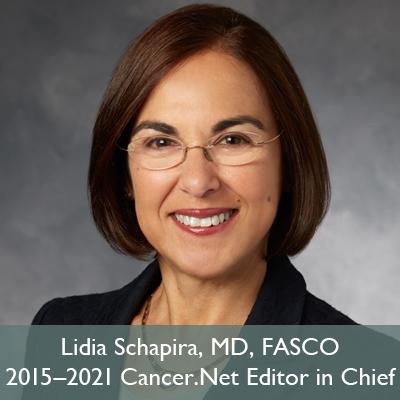
The ASCO Annual Meeting is both exciting and exhausting. Every year, I look forward to going to the scientific sessions to learn about the latest advances in cancer research. I look just as forward to the discussions and debates with colleagues in the hallways after sessions! I also enjoy the opportunities to catch up with my colleagues and former trainees and to find new partners for future collaborations.
Immunotherapies, alone and in combination with other cancer treatments, were the stars of the scientific program. They are transforming the landscape of cancer treatment, offering a chance of effective treatment to people with difficult-to-treat cancers and yielding impressive results. New cancer treatments are often accompanied by unknown side effects that can be challenging to foresee and treat. Immunotherapy has been no exception to this rule. We are still in the early stages of learning how to best treat the side effects that result from altering the immune system, like cytokine release syndrome, but I expect to see a lot progress in supportive care for people receiving immunotherapy in the coming years.
A recurrent theme at this year’s Annual Meeting was that of de-escalating cancer treatments. De-escalating treatment means using less treatment to reduce side effects while still effectively treating the cancer. Using lower doses of chemotherapy, fewer courses of chemotherapy, fewer radiation therapy treatments, radiation therapy targeted at a smaller area, and surgical procedures that remove less tissue are all examples of de-escalated treatments. A number of research studies addressed topics directly related to this theme. For instance, in the PERSEPHONE study, researchers showed that using a shorter duration of treatment with the targeted therapy trastuzumab (Herceptin) in women with breast cancer did not lead to worse outcomes than the current standard of care. In a clinical trial called CARMENA, researchers showed that many people with metastatic renal cell cancer can avoid a surgical procedure thanks to a systemic treatment called sunitinib (Sutent). And, in the TAILORx study, we learned that a large number of women with breast cancer can avoid adjuvant chemotherapy and all of its side effects. These are just 3 examples of research that emphasized the “less is more” treatment approach. I hope that we see the continued development of more precise tools to better determine a person’s risk of cancer recurrence and guide the choice of treatment plan. The search is on for biomarkers and novel tools that will help cancer care teams predict who will get the best results from the available cancer treatments.
Progress in cancer treatments happens not only through discoveries of new drugs, but also through research focused on patients’ quality of life. Another study presented at the meeting showed that using an assessment tool can help older adults with cancer and their caregivers have more productive conversations with their physicians. Dr. Supriya Gupta Mohile, the lead researcher, explained that older adults with cancer may also have other issues or caregiving concerns that should be addressed because they may interfere with cancer treatment.
The future holds promise. I feel this way whenever an ASCO Annual Meeting comes to an end. Not only is research in treatment continuing to advance, but there is a growing awareness of the importance of treating the “whole patient.” Not all cancer advances need to focus on new medications and novel radiation or surgical techniques. Now, we’re paying much needed attention to side effects and quality of life and finding more ways to improve the communication between oncologists and patients. After all, communication is teamwork, and it takes a team to treat cancer.
This year’s Annual Meeting was packed with science and opportunities to learn and develop. I know that I will continue to learn by watching recorded sessions at home on my computer. And, I will also continue to learn from and with my patients every day in clinic.

